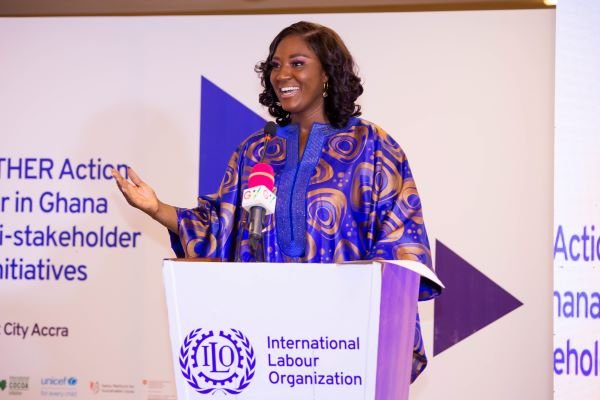In a bid to eliminate child labour in Ghana, the government and several multinational organizations have initiated a two-year project aligned with the 8.7 Sustainable Development Goals (SDGs).
The project, which is the second phase of an ongoing initiative, aims to eradicate the worst forms of child labour by 2025. It will focus on supply chains including cocoa, gold, cotton, tea, and coffee.
Funded by the Ministry of Foreign Affairs of the Netherlands and the International Labour Organization, the project involves multinational companies such as the United Nations Children’s Fund (UNICEF), Japan International Cooperation Agency (JICA), World Bank, and International Cocoa Initiative (ICI).
Scheduled to run from January 2024 to December 2025, the project will be implemented in four districts: Bibiani Ahwiase Bekwai, Asunafo North, Ayensuano, and Assin South. It will also indirectly support 11 districts targeted by the World Bank and Tree Crop Development Project.
Speaking during the joint launch of the project in Accra, Ms Vanessa Phala, the Country Director of ILO Office for Nigeria, Ghana, Liberia, Sierra Leone and Liaison Office for ECOWAS, expressed optimism about the project’s potential impact.
She emphasized the importance of the initiative and the synergy between the involved agencies.
“For the ILO, this is a very important intervention, we have specific conventions 182, that speak to the elimination of child labour which Ghana has ratified. Over the years, we have worked with Ghana, through the Ministry of Employment and Labour Relations to support several interventions. This initiative funded by the Netherlands government is an additional contribution to our efforts to eliminate child labour. It’s a very important initiative and I’m very happy that we also synergizing and coordinating our interventions with other agencies such as UNICEF, JICA, World Bank.
“I believe that through this concept and efforts, we will be able to achieve much better impact. Of course, Ghana is a beneficiary of the phase 2 of the project. I look forward to higher or similar contributions of this intervention in these areas that we will be working with in Ghana.”
Anne Kariuki, a representative of UNICEF, underscored the need to protect all children across the country. She stressed the importance of addressing the root cause of child labour and ensuring every child realizes their potential.
“We need to cover all areas to protect all children, we can only rest unless all children have achieved their potential, gone through education and grown in a safe environment. We need to address the root cause of child labour. UNICEF is key to collaborating with the government to ensure every child realizes his/her goals.”
Dr Ashwini Sebastian, a representative of the World Bank, urged the partners to explore new ways of accelerating progress beyond 2025.
He expressed hope that the project implementation would offer opportunities for synergistic and coordinated action.
“We hope that the implementation of that project will offer opportunities for synergetic and coordinated action with the projects that are launched. The SDG target 8.7 aims at eradicating the worst forms of child labour by 2025. Experts say that this target will not be met. So, as we approach the deadline of that target, we need to find new ways of working to accelerate progress beyond 2025.”
The Joint launch of multi-stakeholder and multi-sectoral initiatives brought together partners from stakeholder institutions and project communities.


